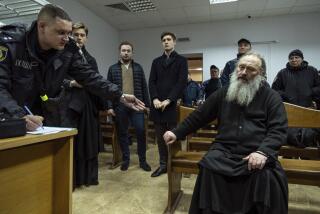Russian Troops Face New Accusations
- Share via
MOSCOW — Russian troops, already under a cloud of suspicion for large-scale detentions and alleged torture of civilians in Chechnya, have been accused of desecrating a treasured centuries-old stone church and tower in the neighboring republic of Ingushetia.
“Barbarism,” Kureysh Buzurtanov, a spokesman for Ingush President Ruslan S. Aushev, said Tuesday. The republic’s government has charged that the destruction was carried out last week by the 58th Army, which has acquired a reputation for committing human rights abuses during the Chechen campaign.
“It is a highly respected monument that is not only important and sacred to the Ingush people, it is also part of the unique legacy that [all] people have inherited,” Buzurtanov said in a telephone interview. “And then Russian soldiers arrived and turned the temple into an outhouse.”
Ingushetia, a republic adjacent to Chechnya, has so far maintained loyalty to the national government in Moscow. But it has been burdened by the war against Chechen separatists because of the heavy presence of the Russian military and about 150,000 Chechen refugees trying to escape the war.
Coming on top of the ongoing zachistki--large-scale roundups designed to root out guerrillas among Chechen civilians--the assault on the monuments appeared to be another blow to the Russian army’s attempts to win the confidence of civilians in the troubled Caucasus region.
Buzurtanov said that the church and tower were in a museum preserve in the mountains and that no military training exercises at the site were authorized by Ingush officials.
“All people in Ingushetia are indignant at such an attitude toward historical and cultural monuments. These soldiers would not have done anything like that in their hometowns,” he said. “In Ingushetia they should remember that they are guests. They have no right to go around and destroy historical monuments right and left.”
The accusations arise at a time when the army is already dealing with the fallout from roundups in three Chechen villages. Male villagers later recounted being severely and indiscriminately beaten, and in some cases tortured with electric shocks.
While such reports have been common since Russian troops reentered Chechnya in 1999, the incidents in the villages of Assinovskaya, Kurchaloi and Sernovodsk involved so many alleged victims that Russian officials were impelled to open a criminal investigation.
Lt. Gen. Vladimir Moltenskoi, the top Russian commander in Chechnya, has asserted that the operations were planned and conducted correctly but has acknowledged that some “violations” may have occurred among rank-and-file soldiers.
A Russian prosecutor on Tuesday said crimes did take place during the roundups July 3 and 4, and promised that cases will be taken to court. But the prosecutor, Sergei Fridinsky, said only six criminal investigations have been opened. Civilians in the villages allege that hundreds of men were abused.
The damaged Khaba-Yerdy church, in the Dzhayrakh district about 25 miles south of the town of Nazran, was ordered built by Tamara, a Georgian queen who came to power in 1184 and promoted the spread of Christianity in the region. It had been restored as a historic monument in Soviet times.
Aushev’s office alleged that 58th Army troops removed part of the roof of the church and a portion of a stone wall, then used the material to spell out on a nearby hillside the words in Russian: “If not us, then who?” Soldiers also were accused of using the interior of the church as a latrine.
The troops also destroyed a centuries-old burial vault, the president’s office said, and helicopters shot off the top of the tower, which was built in the 10th century.
Army officials have given contradictory explanations of the event. Maj. Gen. Valery Gerasimov, commander of the 58th Army, told reporters Friday that the church was not damaged but did say that shooting had occurred there because soldiers had spotted Chechen rebels in the vicinity.
Another spokesman for the 58th Army in Ingushetia met with angry residents of the Dzhayrakh district and acknowledged that troops had taken part in the destruction. The spokesman, identified only as deputy commander Pivovarov in news reports, promised that the troops would help to restore the damage.
Alexei V. Kuznetsov of The Times’ Moscow Bureau contributed to this report.
More to Read
Sign up for Essential California
The most important California stories and recommendations in your inbox every morning.
You may occasionally receive promotional content from the Los Angeles Times.













